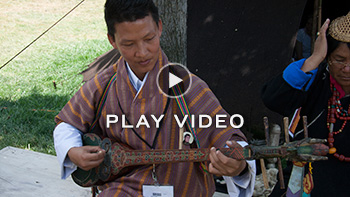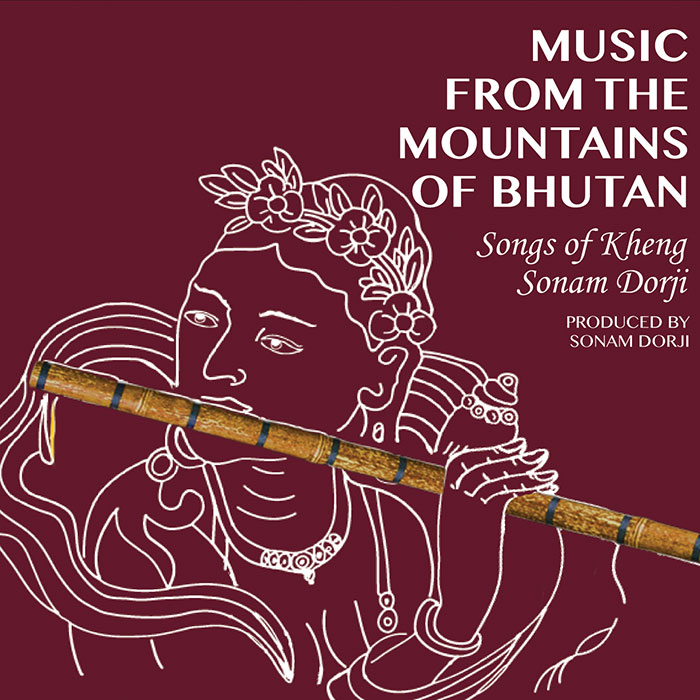Kheng Sonam Dorji
by Janet Herman
Within Bhutan, the central Zhemgang district is one of the more remote and inaccessible areas. Sonam Dorji grew up in the tiny farming village of Kaktong, in lower Zhemgang, an eleven hour trek from the nearest dirt road through thick oak and bamboo forest—a landscape ripe with wild mangoes, bananas, and yams; garnished with exquisite orchids; rife with whistles, hums and screeches of insects, birds, and monkeys. As a child, Dorji never would have imagined the life he lives today in Thimphu—the Bhutanese capital—as a musician, composer, music researcher, and archivist, who passionately shares the traditional music of Bhutan, as well as his own tradition-infused songs, with audiences throughout the country and across the world.
An innately gifted musician, the 36-year old Dorji attributes his fluid, tranquil, soulfully embellished vocal style to his early exposure to birdsong and the gently flowing sound of Zhemgang rivers, as well as to his years of dedicated study with dranyen (Bhutanese lute) masters in Thimphu. He learned his first songs from his mother, who sang daily at home and in the fields. Tragically, she died when Dorji was still a child, at which time he resettled in Thimphu. By age 13, Sonam was broadcasting folksongs on the radio. He soon began composing his own songs, including his first national hit “Maju Maju” (“Don’t go leaving me behind”). He later composed the first-ever nationally broadcast song in the minority language Khengpa, his native tongue, which earned him the nickname “Kheng” Sonam Dorji.
As a teenager, Dorji studied under such respected elders of Bhutanese music tradition as the late Dasho Aku Tongmi, composer of the Bhutanese national anthem, Aup Talo Dawpey, Bhutan's most revered living dranyen player, and Aum Thinlem, Bhutan's most famous female vocalist. Under their tutelage, he became an adept singer of zhungdra, a technically difficult repertoire of centuries-old Bhutanese songs. They are considered to be of the highest spiritual and artistic order, featuring refined Buddhist poetry set to long, slow, and highly decorated melodies.
After high school, Dorji received an India Embassy scholarship to study music at Visva-Bharati University in West Bengal, where he focused on classical vocals, esraj (bowed string instrument), and local folk music. He then went to Maharaja Sayajirao University of Baroda, in Gujarat, India, and completed a Masters in Music—a degree not yet offered in Bhutan. While at the University of Baroda, Sonam traveled throughout India, Bangladesh, and Sri Lanka, gaining his first experiences performing for non-Bhutanese listeners.
The dranyen that Dorji plays is a handsome, fretless instrument made of cypress, with seven nylon strings and hand-painted Mahayana Buddhist motifs on the neck and goatskin-covered body. Like all dranyen, the top of its neck has been carved into a chusin (sea monster) head, which is intended to drive away any invisible spirits attracted to the dranyen's beautiful sound. In addition to the dranyen, Dorji plays yangchen (Bhutanese hammered dulcimer) and lim (Bhutanese flute), as well as the esraj, dotar, sitar, and tambora of India.
In the 2000s, Dorji continued to live and study in India, while regularly returning to Bhutan to visit family and musical elders. While in Bhutan, he made the music videos that have made his face familiar throughout the country, and contributed to other music projects such as the soundtrack to the acclaimed film Travelers and Magicians (2003), directed by Lama Dzongsar Khyentse Rinpoche, which introduced Dorji to North American audiences. In 2008, Dorji was given the opportunity to travel to Washington, D.C., and perform at the Bhutanese exhibition at the Smithsonian Folklife Festival.
The Smithsonian Folklife Festival was a life-changing experience for Dorji, who was stunned by the enthusiastic reception there for him and his fellow performers. Dorji had long felt that Bhutanese traditional music—a largely undocumented oral art form—was endangered. The best artists were aging, more and more young people were migrating out of rural areas and losing touch with their musical heritage, and the influence of western popular music and media were growing rapidly. He had long yearned to do something lasting for his culture, and now, through connections made at the Festival, Dorji found partners and support to realize this aspiration.
In the fall of 2008, Dorji returned to Bhutan full time and founded the Music of Bhutan Research Centre (MBRC)1, the first non-governmental organization in Bhutan dedicated to the study and preservation of traditional Bhutanese music. As Director of the Centre, Dorji brings to bear not only his deep musical knowledge and skill, but also his firsthand experience of Bhutanese ethnic and regional diversity, his facility in nine languages of the area, his background as intercultural interpreter, and his longstanding relationships with key tradition bearers. To date, MBRC has archived over eighty musical elders; staged an historic reunion of master singers and dancers from the 1960s royal court; produced CD recordings, video documentaries, and the first book on Bhutanese musicians. In addition, MBRC established an annual lifetime achievement award in traditional music and the first stage-style annual folk music festival. MBRC has documented the music and dance of several rural festivals, including a rare three-day Bon (animistic) religious pageant in Lower Zhemgang near Dorji's birthplace, bringing him full circle.
As an artist and advocate working within a country known for its “Gross National Happiness” policy2 that values the overall well-being of all citizens, Dorji believes that traditional music is essential. Bhutanese music, he states, conveys unifying spiritual and social values, and a shared sense of identity, history, and beauty.3 “Traditional music matters,” says Dorji, “because it is through music and dance that people fully learn and experience—with their whole mind, heart, and body—what it is to be Bhutanese. It teaches us who we have been for centuries, and—even as we face unprecedented social and technological changes—it teaches us who we still are.”
1 Music of Bhutan Research Centre website, accessed October 2014.
2 Gross National Happiness website, accessed October 2014.
3 “Traditional Music Matters in Bhutan,” Sonam Dorji at TEDxThimphu. Published on Apr 27, 2012.


Atta Sonam Dorji (Brother Sonam Dorji)
from Music from the Mountains of Bhutan
Sonam Dorji


















